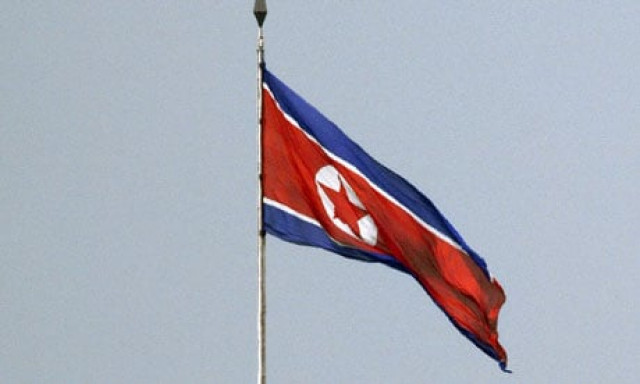N Korea rejects South's 'fraudulent' talks offer
The North's top military body issued a statement insisting that any decisive move on Kaesong would come from its side.

File photo of North Korean flag. PHOTO: AFP/ FILE
South Korea on Thursday had given the North 24 hours to agree to formal negotiations on the future of the Kaesong complex, warning of "significant measures" if Pyongyang declined.
The Unification Ministry said it would announce its next step, with Yonhap news agency reporting that it would call on the 175 South Koreans still in Kaesong to leave immediately.
Dismissing what it called the South's "fraudulent" ultimatum, the North's top military body issued a statement insisting that any decisive move on Kaesong would come from its side.
"If the South Korean puppet regime keeps aggravating the situation, it will be (North Korea), not South Korea, that will be forced to take the final decisive and crucial measure first," the National Defence Commission (NDC) said.
Insisting that South Korean government officials were responsible for the standoff over Kaesong, the NDC said resorting to "ultimatum-like announcements... would only advance their final destruction".
The NDC statement challenged Seoul to go ahead with any pullout, saying it would take all "humanitarian measures" to ensure the safety of any South Koreans who opted to leave.
Established in 2004, Kaesong lies 10 kilometers (six miles) inside North Korea and houses 123 South Korean firms.
The last remaining example of inter-Korean cooperation, it is a crucial hard currency source for the impoverished North, through taxes and revenues and from its cut of worker wages.
The project was born out of the "Sunshine Policy" of inter-Korean conciliation initiated in the late 1990s by then South Korean president Kim Dae-Jung.
It operates as a collaborative economic development zone that hosts South Korean companies attracted by its source of cheap, educated, skilled labour, with turnover in 2012 reported at $469.5 million.
The Korean peninsula was already engulfed in a cycle of escalating tensions – triggered by the North's nuclear test in February – when Pyongyang decided on April 3 to block all South Korean access to Kaesong.
Pyongyang pulled out its entire workforce six days later and suspended operations, angered by the South's mention of a "military" contingency plan to protect its staff at the site.
The South Korean firms that usually operate at the complex have vowed to remain and fight to defend their investment whatever steps the government in Seoul tries to take.
"We've decided to protect Kaesong Industrial Complex no matter what difficulties we may face," a spokesman for the South Korean companies, Ok Sung-Seok, told journalists.
Even given the soaring tensions, the North's decision to suspend operations at Kaesong was unexpected, as neither side has allowed previous crises to significantly affect the complex.
Permanent closure would wipe out the last remaining point of contact and cooperation between North and South, which remain technically at war after the 1950-53 Korean War was concluded with a ceasefire rather than a peace treaty.
Kaesong "is now on the verge of collapse", Friday's NDC statement said. "This is entirely attributable to the reckless war hysteria of the South Korean puppet regime."
South Korean President Park Geun-Hye chaired a meeting Friday afternoon with top security and foreign affairs officials to discuss the impasse over Kaesong.
Park, who was elected last year on a campaign promise of greater engagement with Pyongyang, has pushed the need for dialogue over Kaesong several times in recent weeks.



















COMMENTS
Comments are moderated and generally will be posted if they are on-topic and not abusive.
For more information, please see our Comments FAQ